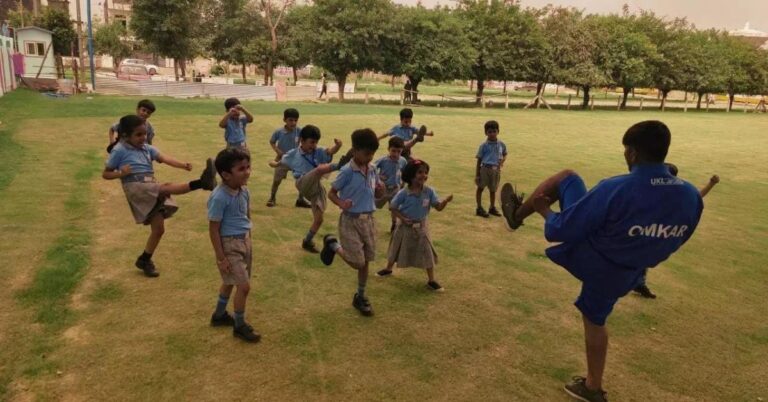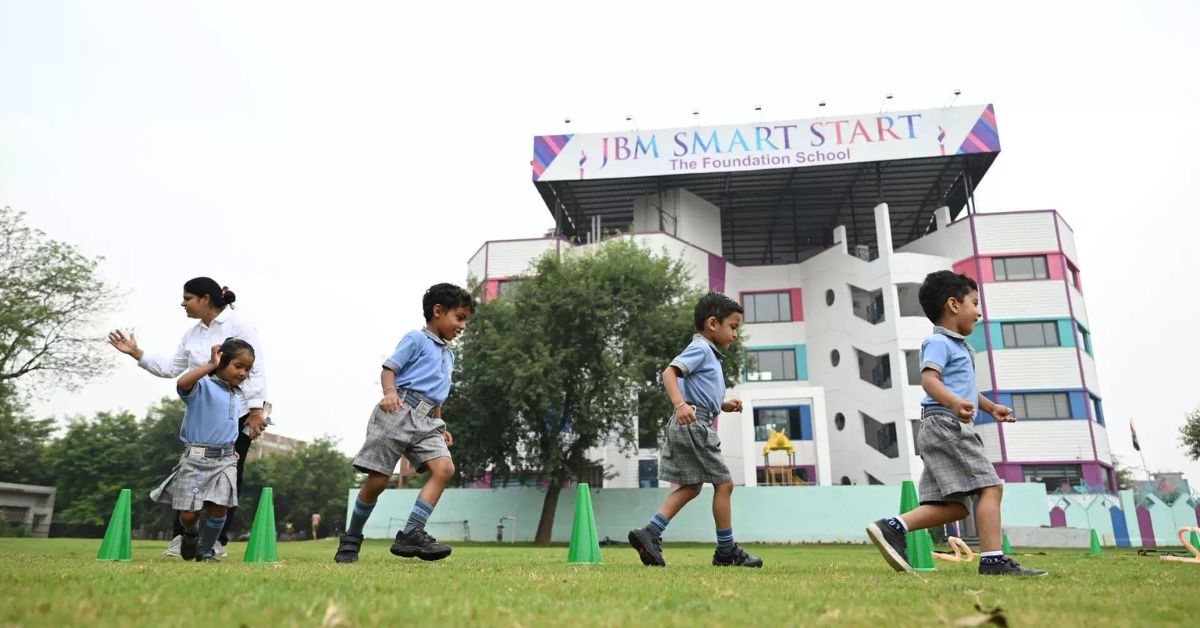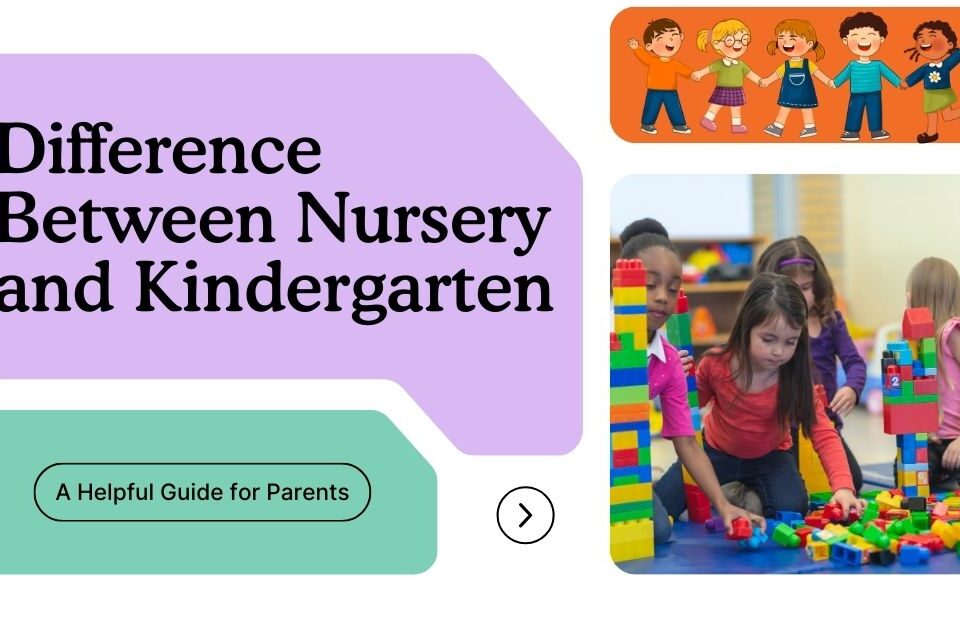
List of Neighboring Countries of India
June 22, 2023
List of Young Ones of Animals
July 12, 2023What Is The Importance Of Physical Education in India?
Indian parents have recently started to divert their focus toward co-curricular activities. As the rise of cognitive and physical skills has taken place in the outer world, parents have realized the importance of additional activities apart from education.
Physical education has become an essential part of students’ school life considering the change in their lifestyle. With the increasing screen time, intake of junk food and non-academic activities have taken students to focus less on their health.
This is where physical education in India becomes more important. It plays an important role in keeping students active and their bodies moving. It helps to sharpen the mind and develops confidence.
A good school in India like JBM Smart Start, Noida helps students to excel in many physical activities and develop many skills.
By dedicating 1 hour every day to physical education, JBM Smart Start, one of the best schools in Greater Noida West enables students to learn tactics and strategies to perform better at both school and at home. The school focuses on students’ physical fitness and overall development.

This blog talks about the importance of physical education in India and why parents must consider it for their children.
Also Read: Importance of Morning Assembly in Schools
Benefits of Physical Education for Students
1. Promotes Fitness And Physical Growth
Physical education plays a vital role in promoting physical fitness and overall health. Regular engagement in physical activities helps students develop muscular strength, endurance, flexibility, and cardiovascular fitness.
It also aids in the maintenance of healthy body weight, reduces the risk of obesity, and enhances motor skills and coordination. By instilling healthy habits at a young age, physical education contributes to lifelong well-being and reduces the likelihood of developing sedentary lifestyles and associated health issues.
2. Fosters Ethical Traits
Physical education programs often emphasise the importance of sportsmanship, teamwork, and fair play. Through participation in team sports and cooperative activities, students learn essential ethical values such as respect, integrity, discipline, and responsibility.
These qualities can extend beyond the gym or playing field and positively impact students’ behaviour and interactions in other areas of life, including academics and personal relationships.
Also Read: Young Ones of Animals
3. Helps in Mental Development
Physical education is not solely about physical fitness but also has a positive impact on mental well-being. Engaging in physical activities releases endorphins, which are neurotransmitters that promote feelings of happiness and reduce stress levels.
Regular exercise has been linked to improved mood, increased self-esteem, and reduced symptoms of anxiety and depression among students. Additionally, physical education often incorporates cognitive tasks and problem-solving activities, which can enhance cognitive function, concentration, and academic performance.
4. Reduces Stress Levels
Physical education provides an outlet for students to release stress and tension accumulated throughout the day. This is another need and importance of physical education.
Engaging in physical activities, such as sports or exercise, helps to reduce anxiety and promote relaxation.
Also Read: Benefits Of Co-Education in School
5. Promotes Healthy Competition
Physical education often involves team sports and competitive activities. This fosters a healthy sense of competition among students, teaching them how to compete fairly, set goals, and work hard to achieve them.
Through participation in organised sports, students learn valuable lessons about sportsmanship, resilience, and teamwork. They also develop important skills such as communication, cooperation, and leadership, which can be applied to various aspects of their lives.
6. Cultural Development
Physical education provides an opportunity for students to learn about different cultures and traditions. Many physical education programs include activities that expose students to a variety of sports and physical activities from around the world.
This promotes cultural understanding, appreciation, and respect. Students can gain insights into different cultural practices, values, and perspectives through exposure to diverse sports and physical activities, fostering a more inclusive and globally aware mindset.
Also Read: Longest Rivers of India
7. Increases Attention Span
Regular engagement in physical activities has been shown to improve student’s attention span and focus. Physical education involves both physical movement and cognitive engagement, requiring students to concentrate on instructions, strategies, and coordination.
Through activities such as sports, dance, or even structured exercises, students develop the ability to concentrate and sustain attention for longer periods. This can have a positive impact on their academic performance and overall ability to concentrate and engage in other learning environments.
8. Creates a Career Opportunity
Physical education can serve as a foundation for various career paths related to sports, fitness, and wellness. Students who develop a passion for physical education may choose to pursue careers as physical education teachers, coaches, personal trainers, sports therapists, sports psychologists, or fitness instructors.
By participating in physical education programs and exploring different sports and activities, students can gain knowledge, skills, and experiences that may inspire and guide their future career choices in the field of sports and physical
9. Improves Academic Performance
Research has shown a positive correlation between physical activity and academic performance. There is the importance of physical education in India as it also contributes to better academic performance.
Physical activity increases blood flow and oxygen supply to the brain, which enhances cognitive function, memory, and concentration.
Additionally, exercise promotes the growth of new brain cells and improves neural connections, which can positively impact learning and information retention.
By incorporating physical education into the school curriculum, students have the opportunity to enhance their academic performance and excel in their studies.
10. Breaks Monotony
Physical education breaks the monotony of a typical school day by providing a change of pace and environment. It offers students a break from sitting in classrooms, studying, and focusing on academic subjects.
Engaging in physical activities allows students to be active, move their bodies, and experience a different type of learning. This variety and break from routine can rejuvenate students’ energy levels, enhance their motivation, and contribute to a more positive attitude towards learning in general.
The active and dynamic nature of physical education classes can also provide a refreshing and enjoyable experience, creating a balance between
Also Read: Road Safety Rules For Students
Summing Up
For students of this age, physical education has become an important subject. It is good for their physical and mental well-being. With the rising awareness about physical and mental health, parents want their kids to engage in physical activities. Therefore, schools with physical education programs are highly considered for quality education.
Frequently Asked Questions
Physical education is important in modern society to retain the health of students. Modern-day students spend most of their time in front of the screen and pay less attention to their health. Physical education helps keep their physical health in check and also fosters other skills.
The main aim of physical education is to develop motor abilities, promote physical health, and enhance speed, flexibility, and endurance. It is a non-academic subject that aims to keep students physically active.
Physical education is an important subject in schools in India. It has various benefits for students’ body and mind. Regular physical activity sharpens cognitive thinking, teaches new skills, and strengthens the body. It also helps students to perform better in their academics.




